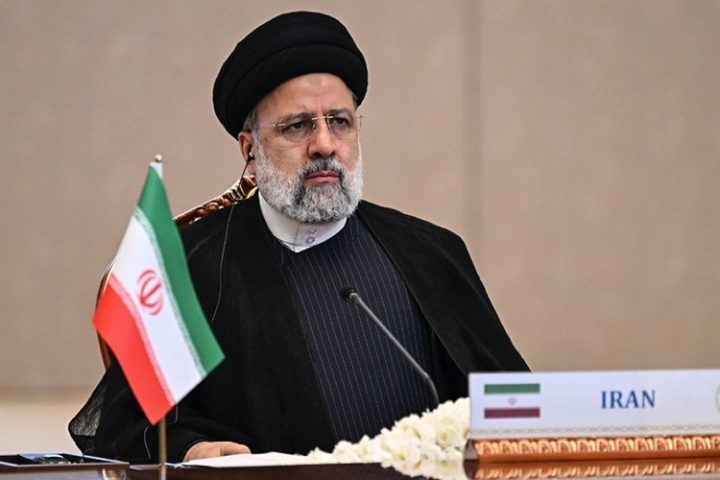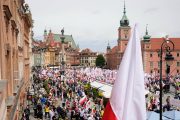
On November 21, Iranian President Ebrahim Raisi called on BRICS nations to label the Israeli government and its military as terrorist groups over their alleged war crimes against Palestinians. He submitted his request to the group’s online Extraordinary Joint Meeting on the Middle East Situation in Gaza.
Iran, which officially will become a member of BRICS in January, had requested the emergency summit to discuss Israel’s war in Gaza. Raisi urged members to use their clout to stop Israel’s “siege” of Gaza and ensure the safe delivery of humanitarian aid.
“It is necessary that this fake regime be recognized as a terrorist regime and its army be regarded as a terrorist organization,” he said, pleading for the bloc’s members to acknowledge the Palestinian state’s right to self-defense while severing relations with West Jerusalem.
“With regards to the constant crimes [committed] by and the racist nature of the fake Israeli regime, free nations [of the world] expect all governments especially BRICS members to immediately put the issue of the severance of political, economic and military ties with the regime high on the agenda,” Raisi added.
Moreover, BRICS nations should also launch an investigation into Israel’s alleged use of illegal white phosphorus and other prohibited arms against civilians, the Iranian president stated.
Iran, Raisi said, will support South Africa’s joint effort — filed with four other countries last Friday in the International Criminal Court — to investigate whether war crimes had been committed in Gaza. However, he maintained that the filing should also hold the United States culpable for Israel’s murder of children in the enclave.
Israel has killed more than 13,500 Palestinians in Gaza since declaring war on Hamas last month, including at least 5,600 children, based on figures provided by Palestinian health officials. At least 6,000 more residents of the enclave are said to be missing. Israel has justified its bombardment of Gaza as a necessary response to the terrorist group Hamas’ brutal cross-border attack, which killed 1,200 Israelis on October 7.
Leaders of the BRICS member countries and incoming members Saudi Arabia, Egypt, Ethiopia, Iran, and the UAE (Argentina might withdraw its BRICS membership bid) attended the virtual summit on November 21 hosted by South Africa. While attendees were expected to publish a joint declaration regarding the conflict, South African President Cyril Ramaphosa revealed that diplomats did not have time to draft the statement. Rather, most countries opted to release individual statements, with most urging for some form of ceasefire.
In response to ongoing tensions in Gaza, South African lawmakers have also backed a motion to shut down the Israeli embassy and cease diplomatic relations until Israel agrees to a cease-fire.
The resolution, put forward by the opposition party Economic Freedom Fighters (EFF), received a majority vote of 248 during a parliamentary session on November 21, with 91 MPs voting against it.
The parliament’s move is the latest measure adopted by South Africa to pressure the Israeli government to cease its military actions in Gaza. Pretoria has repeatedly slammed West Jerusalem for genocide in Gaza.
Ramaphosa, during the aforementioned emergency virtual BRICS+ summit, denounced Hamas for kidnapping Israeli civilians and added that the Palestinian terrorist group had breached international law when it invaded Israeli territory and killed around 1,200 people. Nonetheless, the South African leader also maintained that Israel was committing war crimes in Gaza, quoting the Jewish state’s occupation of Palestinian territory as the root cause of the conflict.
Pretoria has long backed the Palestinian struggle for independence, comparing it to South Africa’s own struggle against apartheid in the 20th century.
Earlier this week, South African Minister in the Presidency Khumbudzo Ntshavheni reported that Pretoria had requested the International Criminal Court (ICC) to issue an arrest warrant for Prime Minister Benjamin Netanyahu by mid-December.
Israel recalled its ambassador, Eli Belotserkovsky, from Pretoria for consultations after the ICC arrest remarks. Pretoria had previously joined Bolivia, Belize, Bahrain, Chad, Chile, Colombia, Honduras, Jordan, and Türkiye in withdrawing its envoy and diplomatic employees from Tel Aviv.
Although South Africa’s ruling party, the African National Congress, had vowed to back the motion to sever diplomatic ties with Israel, the motion’s enforcement lies in the hands of Ramaphosa’s government.
“The president and cabinet are engaged over the matter, which remains the responsibility of the national executive,” presidency spokesperson Vincent Magwenya said, as per reports by Reuters.
On November 22, Pakistan’s newly appointed ambassador to Russia, Muhammad Khalid Jamali, said in an interview with TASS news agency that his country could join the BRICS economic alliance next year.
He said the country had already applied for membership and is relying on Russia’s aid in expediting the membership process. Russia will assume the chairmanship of BRICS in 2024.
“Pakistan would like to be part of this important organization and we are in the process of contacting member countries in general and the Russian Federation in particular for extending support to Pakistan’s membership,” the ambassador declared.
BRICS currently consists of Brazil, Russia, India, China, and South Africa. The alliance will be joined by Egypt, Ethiopia, Iran, Saudi Arabia, and the UAE (and possibly Argentina) in January. Based on analysts’ estimates, the expanded BRICS+ is already economically larger than the G7, a bloc of industrialized and developed countries that comprises the United States, Canada, the U.K., France, Italy, Germany, and Japan.
In total, more than 40 countries have so far expressed interest in joining BRICS, according to 2023 chair South Africa. Russian Deputy Foreign Minister Sergey Ryabkov said in early October that BRICS plans to compile a list of candidates for the union’s partner-state status before its upcoming summit in Kazan in 2024. The official stated that during the Russian BRICS chairmanship, member states will concentrate on expanding the “circle of BRICS friends” further, including countries in Latin America.
In an interview with the China Media Group last month, Russian President Vladimir Putin said the enlargement of BRICS was according to the principle of global multipolarity. Putin claimed that no nation wanted to be on the fringes and operate according to the whims of “some sovereign,” with BRICS reportedly being a platform where countries can establish relations on the basis of equality.



